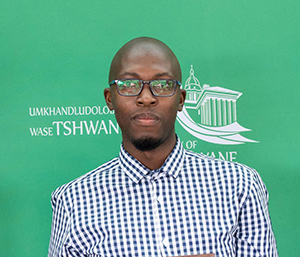News & Events
Why Kgalabi’s portable washbasin idea is making a splash

Kgalabi Mongatane’s washbasin innovation was awarded first prize in the Energy and Electricity category of the Tshwane InterUniversity Innovation Challenge.
A portable, self-assembled washbasin designed by a Unisa computer science student for the City of Tshwane’s healthcare workers could be just what the doctor ordered – especially in these times when handwashing is such a critical activity.
The washbasin, intended for healthcare workers who see patients in temporary structures without piped water, is the brainchild of Kgalabi Simon Mongatane, who has just completed his first year of computer science at Unisa.
Kgalabi’s concept so impressed the judges of the 2020 Tshwane InterUniversity Innovation Challenge that they made him the winner of the Energy and Electricity category of the competition – even though water-related entries had not specifically been invited.
“My solution did not fit into any of the categories of the challenge so I wasn’t expecting much and was shocked when my name was called out at the awards celebration,” says Kgalabi, who was competing against other finalists from the University of Pretoria, Tshwane University of Technology and Unisa.
He came up with the idea of a portable, self-assembled washbasin after talking to healthcare workers as part of his preparations to enter the inaugural Tshwane InterUniversity Innovation Challenge, held in November 2020.
“The healthcare workers I spoke to were very frustrated because they work in containers that don’t have facilities for washing hands,” Kgalabi says. “Every time they see a patient, they have to walk quite a distance to a tap where they can wash their hands.”
Each healthcare worker sees between 30 and 40 patients a day, meaning that healthcare workers use considerable time and energy making constant trips to a faraway tap.
Once Kgalabi’s solution is up and running – as is planned as part of his prize – healthcare workers will be able to wash their hands on the spot.
“My innovation eliminates the need for pipes, networks and plumbing,” he says, explaining that the basin would rest on a fold-up framework with legs, with water flowing from the basin’s water storage unit straight out of its tap. “Later, I will add a mini-purifier to recycle the dirty water.”
Note that this is not just a pipedream. Using bits and pieces of discarded material he found in his garage at home, or was donated by friends, Kgalabi, who has always been good with his hands, made a life-size model of he has in mind.
“When the healthcare workers I spoke to saw it, they said, ‘Oh, that’s so cute.’ I told them I would be back with a working prototype!”
That was not an idle promise. Kgalabi’s prize as the winner of the Energy and Electricity category of the Tshwane InterUniversity Innovation Challenge is R150 000 in seed funding, access to incubation facilities and the opportunity to pilot his portable basin at three sites used by City of Tshwane healthcare workers.
Kgalabi says he is sincerely grateful for the support he has received from Unisa’s Directorate: Innovation, Technology Transfer and Commercialisation (DITTC). When he was worried that his idea would not be accepted for the Tshwane competition, Basanda Pongoma, Technology Transfer Support Officer, encouraged him to persevere.
As a result, Kgalabi’s basin, which he has named the Eco-ba, standing for “eco-friendly basin”, will soon be making a splash among the healthcare workers of the city.
* Submitted by the Research Support Directorate
Publish date: 2021/01/14
